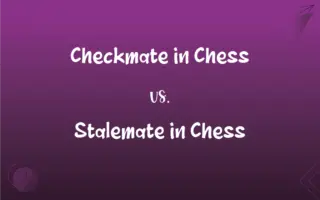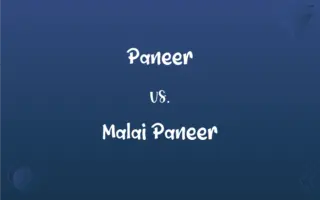Witchcraft vs. Sorcery: What's the Difference?
Edited by Aimie Carlson || By Janet White || Published on March 10, 2024
Witchcraft involves magical practices and spells, often seen as innate; sorcery uses rituals and objects to invoke supernatural powers.

Key Differences
Witchcraft and sorcery are often discussed in the context of their practice and the cultural perceptions surrounding them. Witchcraft is typically associated with the use of magic that is considered innate or derived from spiritual or supernatural sources. It is often seen as a practice that involves spells, rituals, and the invocation of spirits or deities, with a focus on the natural world and its elements. Sorcery, on the other hand, is commonly understood as a form of magic that relies heavily on the use of tools, spells, and rituals to harness supernatural powers. Unlike witchcraft, which is often seen as a more innate ability, sorcery is typically viewed as a skill that can be learned and perfected over time.
Witchcraft is often rooted in ancient traditions and connected to the natural and spiritual world, sorcery is more focused on the manipulation of magical forces through learned skills and techniques. Witchcraft may involve a deep connection to nature, deities, and the spiritual realm, with practices that are passed down through generations or revealed through personal experience. Sorcery, in contrast, emphasizes the mastery of specific magical techniques and the use of objects to channel supernatural power.
The perception of witchcraft and sorcery varies widely across cultures, with each having its own set of beliefs, traditions, and practices associated with these forms of magic. In some cultures, witchcraft is revered and respected, while in others, it may be feared or associated with negative forces. Sorcery, similarly, can be seen as a powerful tool for healing, protection, or harm, depending on the cultural context and the intentions of the practitioner.
The main difference between witchcraft and sorcery lies in the source of their power and the methods used to harness magical forces. Witchcraft is often viewed as a more innate or spiritual practice, while sorcery is seen as a learned skill involving the use of objects and rituals. Both forms of magic have rich traditions and varied perceptions across different cultures, reflecting the complexity and diversity of human belief in the supernatural.
Comparison Chart
Source of Power
Innate ability or connection to the spiritual realm
Learned skills and techniques
ADVERTISEMENT
Practice
Spells, rituals, connection with nature and spirits
Use of objects, rituals, and spells
Cultural Perception
Varied, can be seen as natural or spiritual
Often viewed as a technical skill or craft
Practitioners
Witches, often believed to have an inherent ability
Sorcerers, seen as individuals who have learned the craft
Purpose
Healing, protection, divination, or cursing
Similar purposes, but with a focus on manipulation of forces
Witchcraft and Sorcery Definitions
Witchcraft
A spiritual practice connecting practitioners with the natural and spirit worlds.
His study of witchcraft led him to a deeper understanding of nature.
ADVERTISEMENT
Sorcery
The application of arcane knowledge to harness supernatural powers.
His sorcery was renowned for its precision and power.
Witchcraft
A tradition involving spells, rituals, and natural magic.
The coven gathered at the full moon for a witchcraft ceremony.
Sorcery
The manipulation of magical forces through learned skills and rituals.
He practiced sorcery to alter the course of events.
Witchcraft
Utilization of supernatural forces for personal or communal goals.
Through witchcraft, she sought to protect her home from negativity.
Sorcery
A practice that often employs symbols, incantations, and potions.
The sorcerer used a complex potion in his sorcery to heal the afflicted.
Witchcraft
Witchcraft involves the invocation of deities or spirits in its practices.
She called upon the ancient goddesses in her witchcraft for guidance.
Sorcery
Sorcery requires the mastery of magical techniques and knowledge.
She dedicated her life to mastering the arts of sorcery.
Witchcraft
The practice of magical arts through an innate connection.
She used witchcraft to heal the sick in her village.
Sorcery
A craft involving the use of magical objects and spells for specific outcomes.
Through sorcery, she created a talisman for protection.
Witchcraft
Magic; sorcery.
Sorcery
Use of supernatural power over others through the assistance of spirits; witchcraft.
Witchcraft
Wicca.
Sorcery
Magical power; the use of witchcraft or magic arts.
Witchcraft
A magical or irresistible influence, attraction, or charm.
Sorcery
Divination by the assistance, or supposed assistance, of evil spirits, or the power of commanding evil spirits; magic; necromancy; witchcraft; enchantment.
Adder's wisdom I have learned,To fence my ear against thy sorceries.
Witchcraft
The practice of witches; magic, sorcery, or the use of supernatural powers to influence or predict events.
Wiccans believe in a modernised form of witchcraft.
Sorcery
The belief in magical spells that harness occult forces or evil spirits to produce unnatural effects in the world
Witchcraft
Something, such as an advanced technology, that seems almost magical.
Witchcraft
The practices or art of witches.
Witchcraft
Sorcery; enchantments; intercourse with evil spirits.
Witchcraft
Power more than natural; irresistible influence.
He hath a witchcraftOver the king in 's tongue.
Witchcraft
Adherence to or the practice of Wicca. In this sense the term does not necessarily include attempts at practice of magic, other than by prayers to the deities.
Witchcraft
The art of sorcery
FAQs
What is sorcery?
Sorcery is the manipulation of magical forces through learned skills, rituals, and the use of objects.
Can witchcraft be used for harm?
Like any tool, witchcraft can be used for various purposes, including harm, depending on the practitioner's intentions.
What is witchcraft?
Witchcraft is the practice of magical arts, often seen as innate and connected to the spiritual or natural world.
How do witchcraft and sorcery differ in practice?
Witchcraft is more innate and spiritual, while sorcery focuses on learned techniques and objects.
Can sorcery involve the invocation of spirits?
Yes, sorcery can involve spirit invocation, similar to some practices of witchcraft.
Is witchcraft always inherited?
Not always, but it is often viewed as an innate ability or a gift.
Do witchcraft and sorcery have the same goals?
They can have similar goals, such as healing or protection, but their approaches and practices differ.
How are witches and sorcerers viewed in society?
Views vary widely, from respect and reverence to fear and suspicion, depending on cultural and historical contexts.
Are there different types of witchcraft?
Yes, there are many forms of witchcraft, each with its own practices, traditions, and beliefs.
Can anyone learn sorcery?
Yes, sorcery is considered a skill that can be learned and perfected.
Is witchcraft connected to religion?
In some cultures, witchcraft is deeply connected to religious beliefs and practices.
Are witchcraft and sorcery recognized in all cultures?
They are recognized in many cultures but with varying perceptions and levels of acceptance.
How do practitioners learn sorcery?
Through study, mentorship, and practice, often involving specific rituals and knowledge of magical objects.
Are there ethical considerations in practicing witchcraft or sorcery?
Yes, ethical practices are important in both, with many practitioners following a harm-none philosophy or similar ethical guidelines.
Is sorcery always associated with negative forces?
Not necessarily; sorcery can be used for beneficial purposes as well.
Do witchcraft and sorcery require special tools?
Witchcraft can be practiced with or without tools, while sorcery often involves specific magical objects.
Can witchcraft or sorcery be considered a science?
While not considered a science in the traditional sense, they involve knowledge of natural elements and the metaphysical.
Can sorcery be self-taught?
While challenging, it is possible for individuals to teach themselves sorcery through study and practice.
Is there a community for witchcraft and sorcery practitioners?
Yes, there are communities, both online and in person, where practitioners can share knowledge and experiences.
How do modern views on witchcraft and sorcery differ from historical ones?
Modern views are more varied and can be more accepting, though historical stigma and stereotypes still influence perceptions.
About Author
Written by
Janet WhiteJanet White has been an esteemed writer and blogger for Difference Wiki. Holding a Master's degree in Science and Medical Journalism from the prestigious Boston University, she has consistently demonstrated her expertise and passion for her field. When she's not immersed in her work, Janet relishes her time exercising, delving into a good book, and cherishing moments with friends and family.
Edited by
Aimie CarlsonAimie Carlson, holding a master's degree in English literature, is a fervent English language enthusiast. She lends her writing talents to Difference Wiki, a prominent website that specializes in comparisons, offering readers insightful analyses that both captivate and inform.







































































